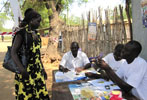
At the Dr. John Garang Mausoleum in the heart of Juba, under a baking morning sun, two dozen or so men wait patiently in line to be registered to vote. A separate line for women lies woefully empty.
As South Sudan prepares itself for the momentous January 9 referendum, the turnout of women voters was low in the initial days of registration, despite the high number of overall registrants. This disparity contributed to the decision to extend the registration period for an additional week, and generated a fresh surge of campaigns to urge families and businesses to promote women to register.
Women comprise 60 to 65 percent of the population of South Sudan, and a low female turnout could cast doubt on how representative of the population the exercise is—potentially delegitimizing what is likely to be a vote for secession.
“The Ministry [for Gender, Child and Social Welfare] is very much concerned about the low turnout of women,” remarked Margaret Mathia, the Undersecretary of the Ministry, at a recent conference. “We are committed to encourage women where they are, and I call upon all women wherever they are to come out and register.”
As noon approached, more women approached the registration center – sometimes in pairs, other times in groups of three or four. Asked why women were showing up then, one registration official laughed and said, “Maybe they were at church. Maybe they were cooking.”
Humor aside, the official hit on some of the factors that may explain the low female voter turnout in the first few days. Many Sudanese women both work to provide for their families and are tasked with caring for their children, leaving them with very little time to travel the often long distances to registration centers. Agatha Ponyi, a 70-yr old woman who stood in line, said, “I work in a hospital. I also work at home where I have many responsibilities. I did not come earlier because I thought registration is a long process with a long queue.”
Women in South Sudan often receive information from informal social cliques they belong to – usually formed among neighbors – and go to the registration centers together. As Wilson Sorro, one registration officer, volunteering at the Juba University registration site observed, “Most of them come in groups. They hear their neighbor say, ‘tomorrow I’m coming,’ so they decide, ‘alright let me go with her.’”
The push for women to register has been working slowly but steadily. Across southern Sudan, voter education teams and civil society groups anticipated that a concerted effort would need to be made to encourage women to turn out to register. Volunteers like Sorro are going door-to-door in towns and villages to explain the referendum process to women specifically and encourage them to participate.
But some people, including South Sudan’s Minister of Information—highly conscious of the fact that 60 percent of registrants must turn out to vote in order for the referendum to be considered legitimate—are worried about another scenario. Come voting day, will registered women be able to make it to the polls?
Referring specifically to the issue of low women voter turnout last week, Minister of Information Benjamin Marial remarked, “If you cannot vote, then do not register. There is a registration process and the possibility of voting. If the two don’t coincide for you, then don’t register.”
Photo: Woman registering for Sudan's April elections. (Maggie Fick)

